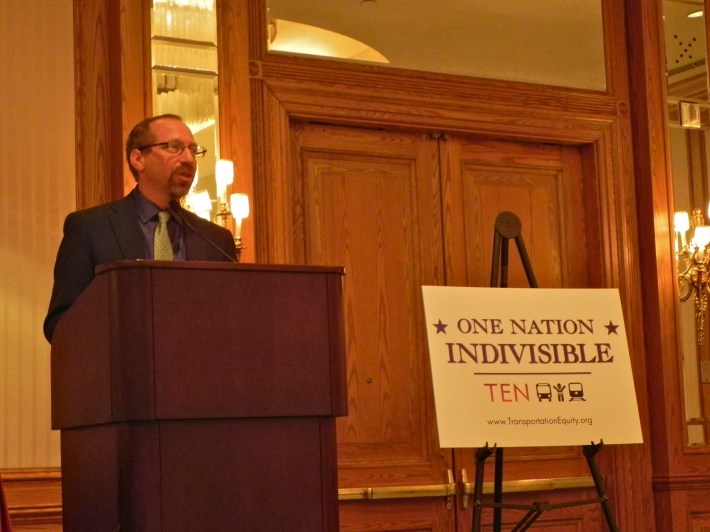USDOT Deputy Secretary John Porcari kicked off the Transportation Equity Network’s “One Nation, Indivisible” conference yesterday with a call to think long-term. By 2050, he said, we can expect the U.S. population to grow by 100 million people, and nearly all of them will live in large urban centers. Problems like crumbling infrastructure, inadequate transit systems, grinding traffic and pollution will be much worse then if we don’t start acting today.
“Are we doing right by the next generation?” Porcari asked. “We know we’re not.”
Echoing President Obama’s “winning the future” rhetoric, Porcari framed the administration’s push for a six-year, $550 billion transportation bill as a potential watershed that can reform a transportation system which has become increasingly burdensome for lower income Americans. “If you make between $20,000 and $50,000 a year,” he said, “odds are that transportation is your number one household expense, higher than housing.”
With the GOP-controlled House making noise about a much smaller reauthorization bill than the one Obama has proposed, better days for affordable transportation are not here yet, nor are they necessarily around the corner. Transit agencies have already been through a couple of years of widespread service cuts and fare increases. The brunt of these cuts have been felt by people of color -- who make up at least 60 percent of public transit ridership.
So in addition to not doing right by the next generation, our current policies are not doing right by today’s generation.
Some of the most pressing questions in transit policy today have more to do with allocating diminished resources than investing in expansions. Marc Brenman, former Senior Policy Advisor in the U.S. Department of Transportation and co-author of The Right to Transportation, led one workshop at the TEN conference focused on Title VI of the Civil Rights Act of 1964, which prohibits discrimination based on race, color or national origin in federally funded programs.
Title VI protects everyone, including non-citizens, and it applies to transit agencies that receive federal funding. If individuals or groups have been discriminated against by local transit policies, they can file administrative complaints with the Federal Transit Administration which must be investigated. Thanks to the Bush Administration FTA, there’s a massive backlog of such cases. “Civil rights wasn’t exactly a priority under Bush,” said Brenman.
Questions of discrimination have recently played out in Oakland, where the FTA found that BART had failed to sufficiently analyze the impact on fares of building an elevated tramway to the airport, and in Atlanta, where some business interests are pushing to restore shuttle bus service to Braves games while leaving lines used daily by city residents untouched.
“When there are cuts, the people who take it on the neck the worst are usually people of color and low-income people,” said Brenman. “We should be asking, ‘How is the entity using its resources? Are the cuts being distributed in a fair way? Is everyone being hit equally badly?’”
Federal Transit Administrator Peter Rogoff, addressing the entire conference, reaffirmed his agency’s commitment to serve the communities who depend the most on public transit, and are always the hardest hit by cuts and under-funding.
“For some people, a reliable transit system is the difference between seeing their kids at night or not,” he said. “It’s the difference between having dinner as a family or not. The difference between being able to supervise homework or not. These are the passengers that have no choice of whether to endure whatever service we serve up—clean or dirty, convenient or inconvenient, reliable or unreliable.”
Rogoff, who was the recipient of TEN’s Rosa Parks Transportation Equity Award in 2010, assured the audience that the FTA’s priority is “preserving service for the communities that need it most.”






